OCZ Vector 150 (120GB & 240GB) Review
by Kristian Vättö on November 7, 2013 9:00 AM EST- Posted in
- Storage
- SSDs
- OCZ
- Indilinx
- Vector 150
Random Read/Write Speed
The four corners of SSD performance are as follows: random read, random write, sequential read and sequential write speed. Random accesses are generally small in size, while sequential accesses tend to be larger and thus we have the four Iometer tests we use in all of our reviews.
Our first test writes 4KB in a completely random pattern over an 8GB space of the drive to simulate the sort of random access that you'd see on an OS drive (even this is more stressful than a normal desktop user would see). I perform three concurrent IOs and run the test for 3 minutes. The results reported are in average MB/s over the entire time. We use both standard pseudo randomly generated data for each write as well as fully random data to show you both the maximum and minimum performance offered by SandForce based drives in these tests. The average performance of SF drives will likely be somewhere in between the two values for each drive you see in the graphs. For an understanding of why this matters, read our original SandForce article.
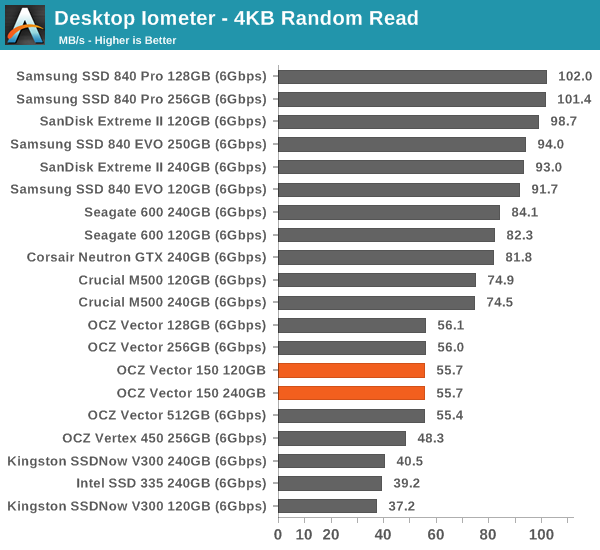
Random read performance remains unchanged but the Vector 150 wasn't supposed to bring any improvements to that anyway.
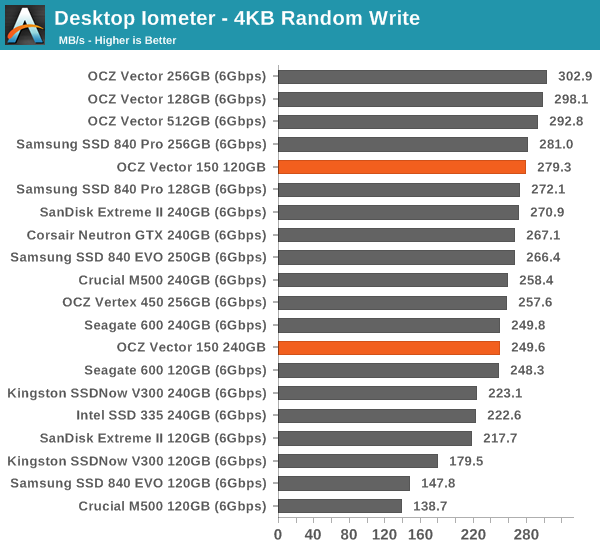
Random write speeds at queue depth of 3 take a hit, though I'm thinking this might be due to the new smaller process node NAND. When the queue depth is increased to 32, the performance is on-par with the original Vector thanks to parallelism.
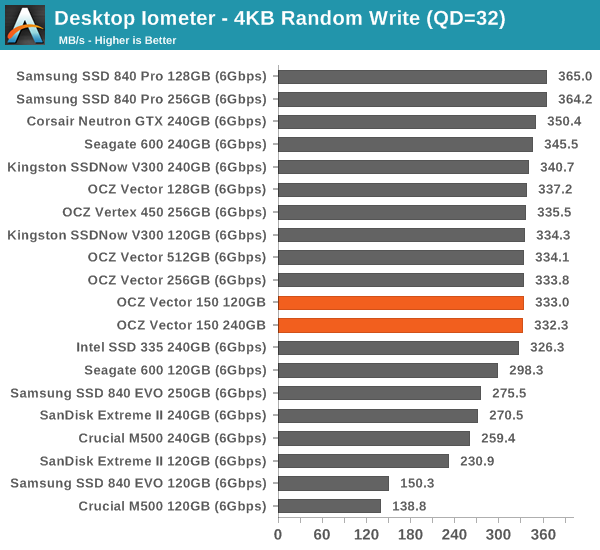
Sequential Read/Write Speed
To measure sequential performance I ran a 1 minute long 128KB sequential test over the entire span of the drive at a queue depth of 1. The results reported are in average MB/s over the entire test length.
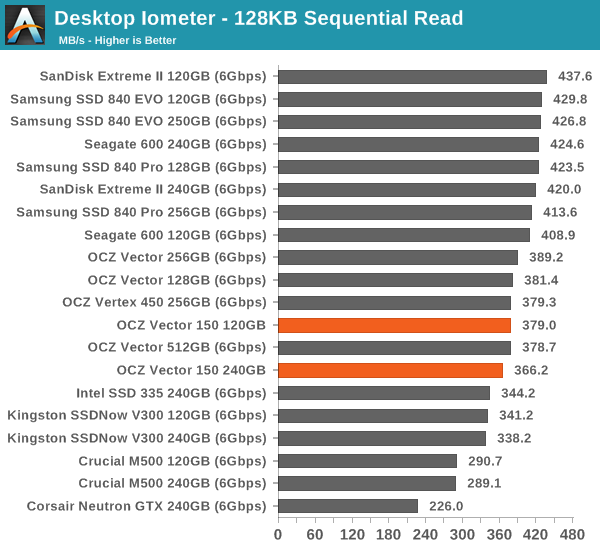
No surprises here either. Sequential performance has remained mostly the same for the last year or so and we won't see another bump until M.2 and other PCIe-based designs get more popular.
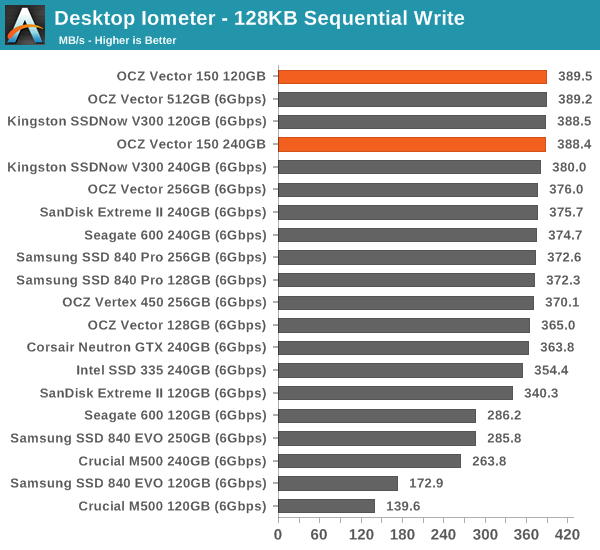
AS-SSD Incompressible Sequential Read/Write Performance
The AS-SSD sequential benchmark uses incompressible data for all of its transfers. The result is a pretty big reduction in sequential write speed on SandForce based controllers.
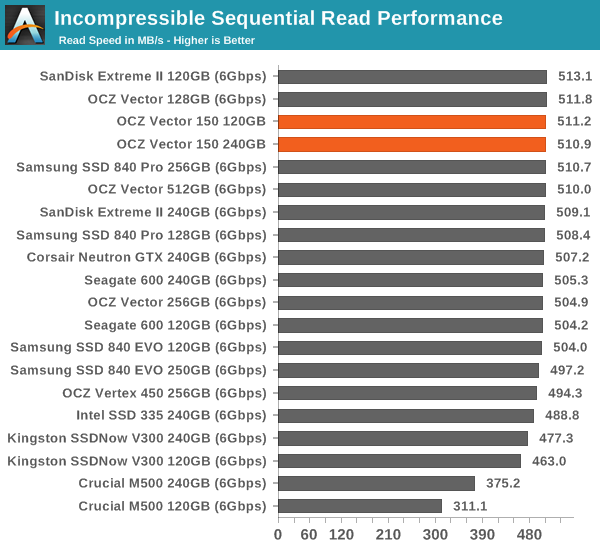
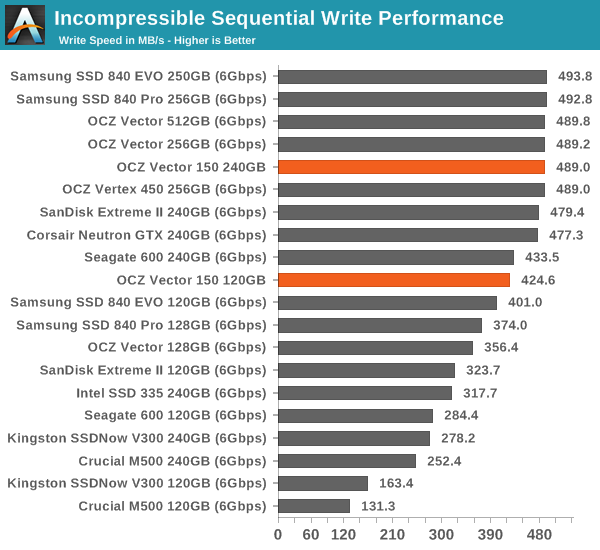










59 Comments
View All Comments
ssdpro - Thursday, November 7, 2013 - link
I really don't see how comparing a SSD purchase to suicide is relevant. Any component can fail at any time - it is not the end of life having a graphics card fizzle or SSD disappear. If anyone remembers when Anandtech reviewed the 840 Pro the sample died and then when they tested the replacement it died. It happens. http://www.anandtech.com/show/6328/samsung-ssd-840... I still buy and will buy Samsung, I have bought and will buy from OCZ.JellyRoll - Thursday, November 7, 2013 - link
Good luck with that.evonitzer - Friday, November 8, 2013 - link
As long as we're playing the anecdotal game, I bought a Vertex 2 and it failed, but allowed me to recover all the data from it. It was a little weird, but whatever. Reinstalled to it and it worked fine. Then I switched to a Vertex 4 and it has treated me well. So ...Samus - Friday, November 8, 2013 - link
I just don't get why people would consider an OCZ drive over the competition. It'd be like buying a Quantum Bigfoot, IBM Deskstar 75GXP or Conner S35-series drive, all of which either had storage, performance or price crowns of their time, but all well-known for their poor reliability, including their successors. All of these companies failed.Quantum was purchased by Maxtor who discontinued the Bigfoot, IBM was purchased by Hitachi (who struggled to get those GMR heads to work beyond the 60GXP) and Conner went bankrupt and the assets were ironically purchased by Quantum who liquidated everything but their tape-backup business.
TheWrongChristian - Friday, November 8, 2013 - link
The difference is that the Samsung samples were promptly fixed with a firmware update before it was released to retail. I'd have no faith in OCZ fixing such firmware issues, and the Samsung 840 Pro has gone on to be a solid dependable drive.These failures are almost always firmware bugs, I think SSD generally rarely physically fail (though I have no numbers to back that up) and OCZ don't have a stellar reputation in that department.
Not that OCZ will be around to honour the 5 year warranty anyway....
djscrew - Saturday, November 9, 2013 - link
i do have to agree, my revodrive takes forever to boot... gonna have to try that space thingweiran - Thursday, November 7, 2013 - link
Interesting SSD but at this price I think I'd rather have the Sandisk Extreme II.JellyRoll - Thursday, November 7, 2013 - link
Yes I agree. Sandisk had been around 25 years. Ocz will be lucky to be around for another three months, thier cash burn is ridiculous and they are running on fumes provided by loan sharks....which is why they are a penny stock, yet no one buys them. The reason they haven't been bought is that the barefoot is just a rebadged marvell controller.they have no ip.chubbypanda - Thursday, November 7, 2013 - link
SanDisk? Since 1988, but for how many years are in SSD business (very, very short time).JellyRoll - Friday, November 8, 2013 - link
Yes, but they have produced NAND since its introduction 25 years ago. That is experience, and longevity.